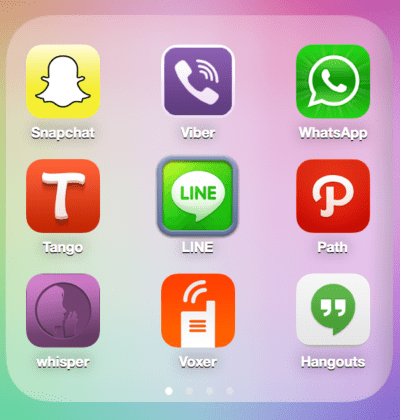 I met with an entrepreneur yesterday who suggested that mobile messaging apps would replace social networking in the coming years. This is an interesting thesis and some data does support that the youngest demographic are moving away from Facebook towards a variety of newer messaging applications. When you look at how Facebook itself has evolved, the newsfeed is the focus of the experience today so it's become predominately a shared asynchronous messaging app or as Facebook writes "a constantly updating list of stories from people and Pages that you follow on Facebook". Over the past few years, the list of messaging apps that I've used is too long to remember: Kik, What'sApp, MessageMe, GroupMe, Fast Society, Beluga, Snapchat, Hangouts, Line, Viber, Rebtel, Skype, Adium, iMessage, etc. etc. Some of these apps have delivered valuable experiences that have had niche use-cases for me, but few have become mainstays on my home screen. I've recently consolidated 90% of my messaging activity around iMessage. Apple has done a nice job connecting all devices via a common user ID with iOS7 and Mavericks. Communicating via desktop in my office and continuing that same thread of conversation via mobile later in the day is convenient and easy. With integration of Google Chat, Yahoo!, AIM and Jabber, they've replaced Adium and allowed me to turn off Google Chat in Gmail (I turned off Facebook chat long ago). When I spend time on Android, it's the one feature I miss most.
I met with an entrepreneur yesterday who suggested that mobile messaging apps would replace social networking in the coming years. This is an interesting thesis and some data does support that the youngest demographic are moving away from Facebook towards a variety of newer messaging applications. When you look at how Facebook itself has evolved, the newsfeed is the focus of the experience today so it's become predominately a shared asynchronous messaging app or as Facebook writes "a constantly updating list of stories from people and Pages that you follow on Facebook". Over the past few years, the list of messaging apps that I've used is too long to remember: Kik, What'sApp, MessageMe, GroupMe, Fast Society, Beluga, Snapchat, Hangouts, Line, Viber, Rebtel, Skype, Adium, iMessage, etc. etc. Some of these apps have delivered valuable experiences that have had niche use-cases for me, but few have become mainstays on my home screen. I've recently consolidated 90% of my messaging activity around iMessage. Apple has done a nice job connecting all devices via a common user ID with iOS7 and Mavericks. Communicating via desktop in my office and continuing that same thread of conversation via mobile later in the day is convenient and easy. With integration of Google Chat, Yahoo!, AIM and Jabber, they've replaced Adium and allowed me to turn off Google Chat in Gmail (I turned off Facebook chat long ago). When I spend time on Android, it's the one feature I miss most.
What's interesting about this market is the disproportionately large number of services who have developed big user bases and/or received acquisition offers. Enormous value continues to be placed on the engagement and mindshare that is captured by messaging. AIM was the original instant messaging app and while it captured the attention of a huge number of users who remained loyal after their usage of Aol subsided, it never really figured out monetization. At Aol, it was discussed as a missed opportunity and they considered selling the asset on multiple occasions. Is history repeating itself today with the wide array of new messaging apps competing for mindshare or are we living in a new paradigm where messaging activity is more valuable? Most apps in the market haven't yet introduced monetization in a serious way, waiting for peak usage. Some of the apps popular in Asia - Line, KakaoTalk, etc - are experiencing success with monetization through in-app purchases of emoji and games, though it's not clear if that success will bridge to the American market. I'm still wrapping my head around messaging as a business, but it's clear there's a fierce battle emerging for mindshare in social with incumbents feeling pressure to own mindshare and willing to spend significant capital to do so.